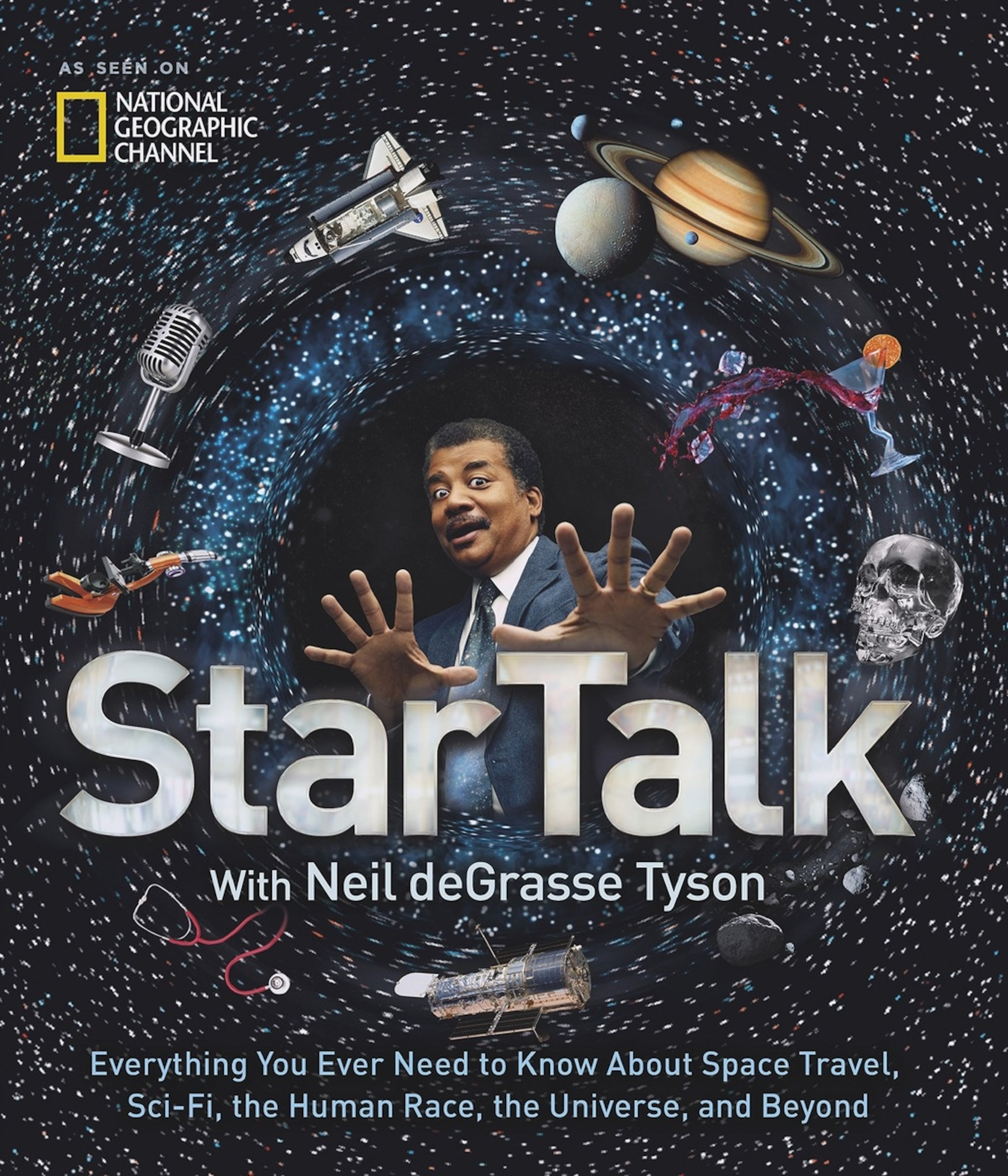
What Pop Culture Can Teach You About Science
Neil deGrasse Tyson will use any means necessary—including zombies—to help people learn about science.
Neil deGrasse Tyson, the director of the Hayden Planetarium in New York City, approaches space with a mix of pop culture, science, and humor. When the Cosmos television series was being rebooted, he was a natural fit to fill Carl Sagan’s shoes. Now he hosts StarTalk, a science talk show on the National Geographic Channel.
In his new, richly illustrated book, StarTalk: Everything You Ever Need to Know About Space Travel, Sci-Fi, the Human Race, the Universe, and Beyond, the ebullient astrophysicist takes us on a new journey through the cosmos, during which he expounds on subjects as diverse as zombies, cooking in space, and whether life may have begun on Mars.
Talking to National Geographic from New York City, his hometown, Tyson explains why he had to chart his own path to becoming a scientist; how reaching Proxima b would take us a thousand human generations; and why the next horizon in astrophysics will be dark matter.

Astrophysics seems a mostly white-dominated field. Talk about how you got into it—and whether being an African American helped, or hindered, you.
I never have those thoughts. What’s your race? I’m in the human race. That’s how I view the world so it wasn’t, Oh, I can’t do it because our skin colors don’t match. I can do it because we’re all human. They say, you need a role model. Well, if I needed a black person from the Bronx to have become an astrophysicist before I could consider it, I would never have been an astrophysicist! [Laughs.]
It’s a very simple story. My parents had a very deep sense of social justice and moral compass. When I was nine years old, I made my first visit to the Hayden Planetarium, my local planetarium. And I was hooked for life! I joke about this but I’m actually quite serious when I say, I think the universe chose me. We went into a museum, “Oh, let’s go to the planetarium.” Next, I’m sitting there, the lights dim, the stars come out, and this big machine in the middle of the room is turning. Then this voice comes from the dome—that planetarium director voice. And that was it! I committed the rest of my life to exploring and discovering the universe.
Your book talks among other things about zombies and how to take a poo in space. Isn’t this a bit beneath an eminent scientist like yourself?
It depends on how you view the world. The criterion I invoke is this: Would a person be interested in it and, by covering that topic, do they learn science?
Yes, we talk about zombies. However, if you use zombies as proxies for a slow-moving virus that has no cure, then zombies are a perfect analogue to a virus outbreak. In TV shows like The Walking Dead, it’s not just that a zombie’s going to eat you. It’s the psychological consequences of being alive at a time where most of the people you ever knew are dead, or have become zombies, and the services you’ve come to depend upon no longer exist. People will no longer be working at the reservoir, so you’re not going to get water. The farmers are dead, so you’re not getting fresh vegetables. Slowly, your civilization collapses.
So when we talk about zombies or anything pop culture-y—is that a word? [laughs]—we are finding the science in it and using that pop culture as a scaffold for the science. Taking you to a scientific place that you thought might not have existed is the spirit and soul of my TV show.

Mars beckons as the moon once did. Do you think we will see a successful manned voyage to the red planet in our lifetimes? And what are the biggest obstacles we will have to overcome?
Great question! I like the notion that it beckons because we’ve already been to the moon, so we’re looking at the next destination. I assume you mean, will people get there? I think in our generation, yes. But it’s not clear what will motivate people unless they realize that when you have big, hairy, audacious goals such as that, you can energize a nation.
If you say, We’re going to Mars, who’s with us?, you will attract in your educational pipeline the best engineers, biologists, geologists, and meteorologists, who will help you engage this mission. There’ll be patents awarded because you’ll be doing things no one has done before. That’s what exploration means. That doesn’t even reference that it’s a grand vision, which is in our DNA. If you want to assure the future financial stability of your country, do something that will stimulate innovation.
The biggest obstacle in reaching Mars is getting people to understand why it’s something that should happen. That sounds like a cop-out answer but it’s really true. I joke that I should go to the president of China and whisper to him, “Can you leak a memo that says you want to put military bases on Mars?” [Laughs.] Oh, my gosh! Then we’ll go ballistic and put colonies on Mars! You don’t want war to be the motivation but that’s what sparked the Apollo era, the Cold War with the Soviet Union.

Another point that is hardly ever made is that when we went to the moon we looked back and, one could argue strongly, discovered Earth for the first time, because the modern conservation movement began with the first images of Earth from the Apollo program. The Earthrise photo was December 1968, and we landed on the moon July 1969. Within a year, in the U.S., we would create the Environmental Protection Agency and, in the next few years, the National Oceanic and Atmospheric Administration (NOAA).
When we saw the picture of the entire Earth, as nature intended us to view it, not with color-coded boundaries of countries, but with just ocean, land, and clouds, our sense of our planet changed. It was as though there was a firmware upgrade in our stewardship of this planet.
Scientists now believe life may actually have originated on Mars. Tell us about “panspermia.”
It’s a great word, isn’t it? [Laughs.] Pan means across, and spermia is the germination of life. It’s not so much that we think that life might have begun on Mars first; it’s that we cannot rule it out. Our understanding of the solar system allows it to have occurred that way. Mars once had liquid running water on its surface, and everywhere on Earth where you find water, you find life. Is it so much of a stretch to say Mars, when it had water, also had life, even microbial?
We have also learned in recent decades that when you have an asteroid strike, there’s a catastrophic wave set up in the ground below it, which can fling surrounding rocks into space, achieving escape velocity from the host planet. It’s like if you take Cheerios and sprinkle them on your bed and then punch the mattress. The Cheerios will bounce up. And these rocks may have had stowaway microbes. If they now go into space, where there’s no air and high radiation, if the microbes are not resistant to zero air and high radiation, they’ll die. If you are a microbe that survived that trip, it means your cell walls were endowed with radiation resistance and can also be freeze-dried.
On Earth there exist microbes that can resist high radiation and you can freeze dry and reconstitute them. There is no [evolutionary] selection for that on Earth. Why would a bacteria need to be able to survive high radiation unless its ancestors made the trip through space from Mars? These are the plausibility arguments we evoke. It could be that all humans are descendants of Martians.

A SpaceX rocket recently exploded at Cape Canaveral. Do you think commercial space exploration has a future? Or are the so-called “Rocketfellers” just billionaires with oversize egos?
[Laughs.] Do you know any billionaires that don’t have an ego? [Laughs.] But the fact that the rocket exploded is evidence that SpaceX is on the frontier. If you are experimenting and nothing goes wrong, you are not on the frontier. You are not in the game. This is not just in science. Mario Andretti, the race car driver, famously said, “If you are in full control of your car, you are not in the race.”
I have not spoken to Elon Musk since then, but I have no doubt that while it is disappointing that it exploded, it is part of their exploratory model to expect some of their experiments to fail. So, yes, private enterprise has a future. Governments usually do things that have never been done first. The first Europeans to the New World were not the Dutch East India Trading Company. It was Columbus, funded by Spain. So I think NASA should continue to expand the space frontier and then seed the routine aspects to private enterprise, which would then presumably do it more cheaply.
There was a flurry of excitement recently at the discovery of Proxima b. Do you believe we will one day find intelligent life beyond Earth?
What was exciting about Proxima b was not that it was a planet or even an Earth-like planet, but that this is the closest planet to our star system because it’s orbiting the closest star system to the sun. So, if you were to make a catalog of places you wanted to visit, in search for life as we know it, that would be the number one target planet.
Here is the problem: It’s four light-years away, and how fast can we move through the solar system now? If you take the New Horizons spaceship heading to Pluto and aim for Proxima b, it would take you, what, 50,000 years to get there? That’s between one and two thousand generations of humans. So it doesn’t seem realistic to me. That’s why we have telescopes and radio wave communication in case there is intelligent life there. We have secondary ways of doing it rather than just going there.

The idea of time travel has haunted the human imagination for centuries. Might it one day be possible? And what are the next big discoveries in space you are excited about?
We know how to go into the future; you just go fast, and time will tick more slowly for you. Then you return home and maybe everyone would have forgotten about you depending on how long you stayed away and how fast you moved. That’s plain vanilla Einstein relativity. Time traveling to the past? There are some plausible models for how to do that but they require a command of sources of energy that we don’t have access to. So it’s not realistic to think it could happen tomorrow.
What am I excited about? Another way of asking that is to say, About what are we most profoundly ignorant? We don’t know the origin of dark matter or dark energy. These are major drivers of cosmic phenomena. By some estimates, dark matter and dark energy account for 95 to 96 percent of everything that drives the universe. If we were to have major discoveries in those realms, it could be significant in terms of our general understanding of what we don’t know—which is why we have top people designing spacecraft to see whether they’re even asking the right question.
This interview was edited for length and clarity.
Simon Worrall curates Book Talk. Follow him on Twitter or at simonworrallauthor.com.